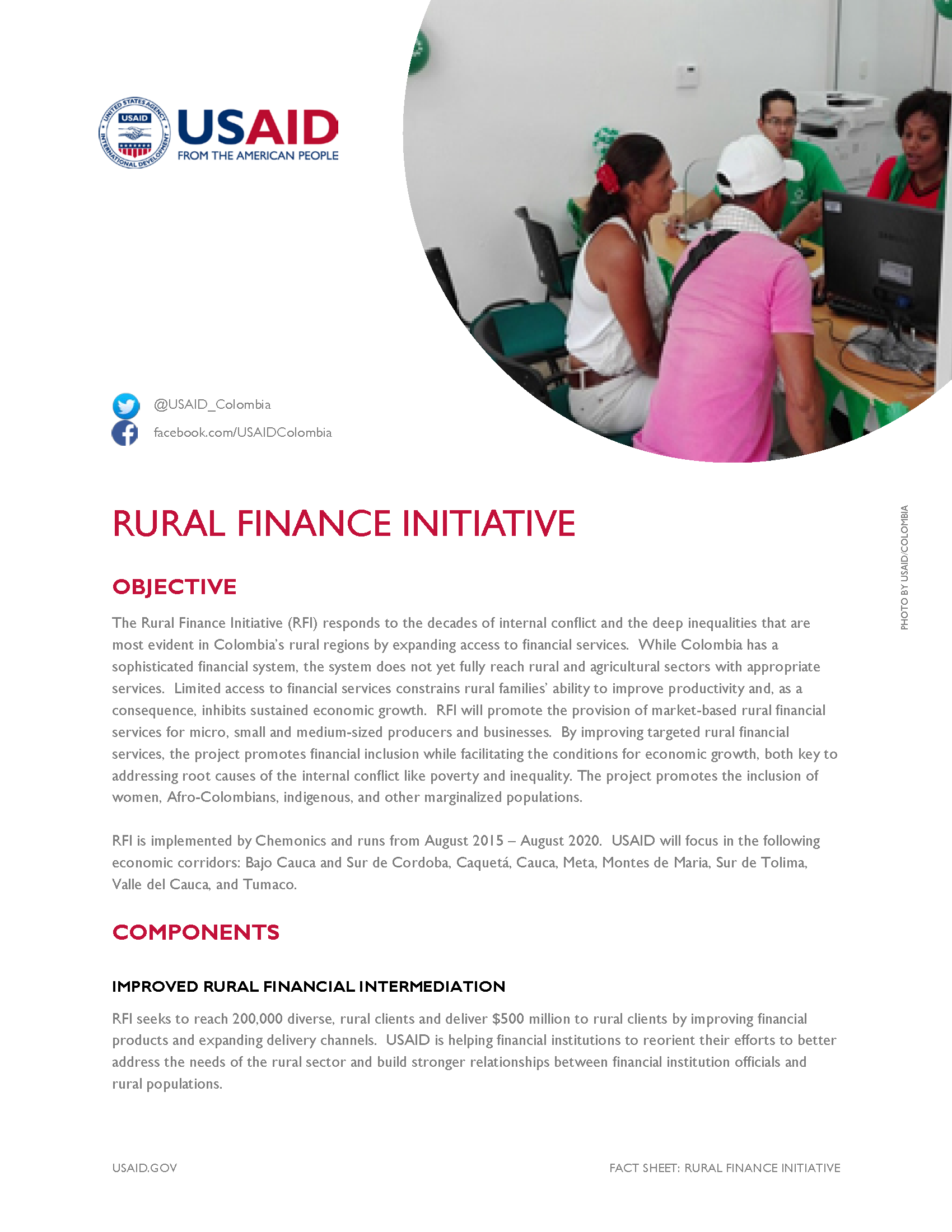Speeches Shim
Rural Finance Initiative Fact Sheet ![]() (pdf - 166k)
(pdf - 166k)
OBJECTIVE
The Rural Finance Initiative (RFI) responds to the decades of internal conflict and the deep inequalities that are most evident in Colombia’s rural regions by expanding access to financial services. While Colombia has a sophisticated financial system, the system does not yet fully reach rural and agricultural sectors with appropriate services. Limited access to financial services constrains rural families’ ability to improve productivity and, as a consequence, inhibits sustained economic growth. RFI will promote the provision of market-based rural financial services for micro, small and medium-sized producers and businesses. By improving targeted rural financial services, the project promotes financial inclusion while facilitating the conditions for economic growth, both key to addressing root causes of the internal conflict like poverty and inequality. The project promotes the inclusion of women, Afro-Colombians, indigenous, and other marginalized populations.
RFI is implemented by Chemonics and runs from August 2015 – August 2020. USAID will focus in the following economic corridors: Bajo Cauca and Sur de Cordoba, Caquetá, Cauca, Meta, Montes de Maria, Sur de Tolima, Valle del Cauca, and Tumaco.
COMPONENTS
Improved Rural Financial Intermediation
RFI seeks to reach 200,000 diverse, rural clients and deliver $500 million to rural clients by improving financial products and expanding delivery channels. USAID is helping financial institutions to reorient their efforts to better address the needs of the rural sector and build stronger relationships between financial institution officials and rural populations.
Reduced Barriers to Rural Financial Services
RFI incentivizes and supports the entry of financial institutions into new markets while also promoting the development of innovative financial products. Through this component, RFI will continue to apply the principles of profitability, sustainability, and replicability by reducing risk and promoting innovation to further expand demand-driven services.
Modernized legal and regulatory Framework
An efficient rural financial system requires a supportive enabling environment that provides the right market incentives to supply-side stakeholders to serve different types of farm and rural enterprises. RFI is facilitating a highly focused policy agenda to promote adjustments to the regulatory framework and further enhance rural financial inclusion.
RESULTS
- Reached more than 146,000 clients in 195 municipalities.
- Facilitated the approval of roughly 49,000 loans, 15,402 insurance policies, as well as the opening of more than 82,145 savings accounts.
- Assisted with the startup of operations for 26 new banking correspondents[1] and 7 new branch offices through incentive grants.
- Mobilized nearly $200 million of commercial bank capital for rural clients.
- Awarded incentive grants for financial innovation to eight financial institutions totaling $1,379,930. These funds were matched by an additional $4,374,833 in resources.
[1] Banking Correspondents (BCs) are a distribution channel that allows financial intermediaries to provide some financial services (e.g. cash deposits, withdrawals, balance inquiries, etc.) through third parties (e.g. small shops, stores, etc.). This allows financial intermediaries to expand services in regions where their presence is very limited.


Comment
Make a general inquiry or suggest an improvement.